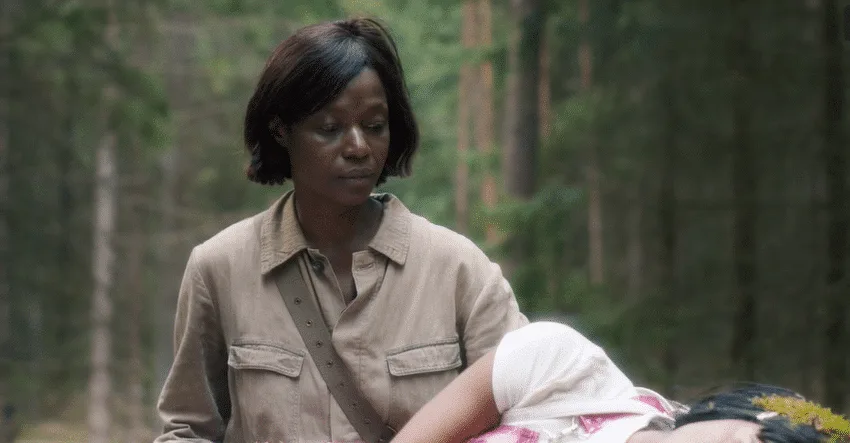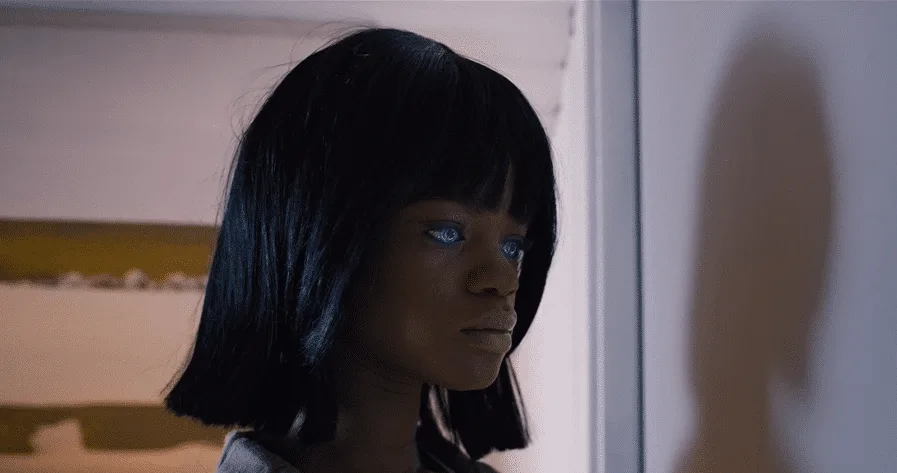
Science fiction has become very low-key these days, hasn’t it? Perhaps it’s as a result of the way we’re already living with a lot of the technology – and repercussions – which much of classic sci-fi could only imagine. Now, we’re left to play catch-up, wondering what all of these developments and further developments can mean for us. The fantasy elements in sci-fi now often look more familiar, feel closer; they’re taken as a starting point, a new angle for looking at the human side of the equation. I Am (2021) is a very subtle and engaging example of this. If it has an overarching question, it’s probably: who deserves our sympathies here?
Noé (Sheri Hagen) lives alone and, often troubled by vivid dreams, she seems to live a fairly odd, isolated existence, picking up and fixing old pieces of tech which she finds in the woods. One day, she finds a defunct android (Melodie Wakivuamina), takes ‘her’ home and successfully repairs her. Once restored, the android seeks to orientate herself by seeking a purpose; she wants to work. But she also seems to have some very human fascinations. Noé laughingly asks the android, called Ela, if she has always answered every question with another question; perhaps Ela was programmed differently, she suggests. What is clear is that Ela is seeking some kind of purpose. She and Noé discover more about one another, but this development is ultimately not comfortable, profitable or desirable for Noé, whose good fortune at finding Ela quickly dwindles.
Jerry Hoffman’s direction here, alongside cinematography by Lena Katherina Krause, has lent this film a very attractive aesthetic. Noé’s frequent nightmares take place against the dark blues and purples of the woods outside, contrasted almost instantly against the warm, homely cabin where she lives. There’s a lot of either natural light or low light used, something which creates an appealing contrast against the world without, which is clearly a place of technological advancement, with creations such as Ela apparently littering the ground. Ela herself is very eerie: offering more contrasts, the interplay between the flesh of the actor and the super-subtle inclusion of tech fittings and trappings is very effective, retaining an ability to confuse the eye: one minute you are looking at a girl, and the next an item. Wakivuamina’s performance is highly effective; I felt very wary of what she was not telling. Also, her face gradually humanises over time as she asks the right questions of her new keeper. It’s another barely discernible, but important shift.
Noé keeps her own secrets as best as she can, but as her relationship with Ela changes, their dynamic changes. Their conversations go from a strange, uncomfortable Q&A, to a confessional – which turns out to be ill-advised – through a humorous truce to an unpleasant symbiosis, which Noé resists with some considerable, understandable fear. The origin of her nightmares not only becomes clear, but the film offers the distinct impression that they were in some ways foreshadowing events to come. The narrative here is perfectly fitted to a less-than-thirty-minute run time, taking a minimal number of plot elements and affording them enough time to come to fruition.
For all that, though, I Am holds a few questions back too, only giving us a glance at just what is really out there beyond the tree canopy whilst offering no cut-and-dried moral lesson. Everything which Ela asks of Noé, we could really ask of ourselves; accordingly, this is a surprisingly nuanced short film with a fine balance of visuals, narrative and aesthetics.
I AM (2021) will be featuring at the Cleveland International Film Festival from April 7th to April 20th.
